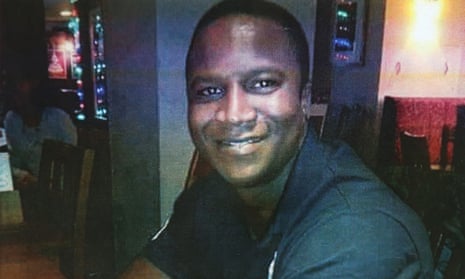Nine police officers involved in the death in custody of a Sierra Leonean man, Sheku Bayoh, have finally agreed to give statements to independent investigators more than a month after he died under arrest.
The Police Investigations and Review Commissioner (PIRC) disclosed on Thursday they had made a number of unsuccessful attempts to secure interviews with the officers after Bayoh died of suspected asphyxia as they restrained him on a pavement in Kirkcaldy on 3 May.
Sources close to the investigation said PIRC investigators have been increasingly frustrated by the time taken by the officers to agree to provide statements and to hand over their police notebooks. It is understood several officers have been interviewed for the first time in the last few days.
The Guardian disclosed last month that Bayoh, 31, a gas engineer with two children, died after being hit by both CS spray and a pepper spray as he was being restrained with handcuffs behind his back and with leg restraints. Police were responding to complaints he was attacking cars and wielding a knife on the street.
A PIRC spokeswoman alluded to the commission’s frustration. “Since the hours following [Bayoh’s] death on Sunday 3 May 2015, [the PIRC] has made several attempts to secure statements from the arresting officers. Those officers have now agreed to provide statements to the PIRC,” she said.
The PIRC statement follows a simmering row between the Scottish Police Federation and the family. The federation’s lawyer, Peter Watson, again alleged earlier this week that one “petite” female officer involved in Bayoh’s arrest had been severely beaten and left in fear of her life during the incident. Those claims are contested by the family.
Aamer Anwar, the lawyer for the Bayoh family, said the long delay highlighted a significant weakness in Scottish regulations for investigating deaths in police custody, which led to unacceptable delays which would never be allowed if a member of the public was involved in a death.
Anwar has complained to the Lord Advocate, Frank Mulholland, after being told that Police Scotland commanders issued new guidelines in March telling serving officers they were entitled to delay giving statements until they had legal advice if a case could lead to a criminal complaint.
In England and Wales the Independent Police Complaints Commission has far tougher rules: police involved in deaths in custody are required to give immediate operational statements and then provide a second, more detailed statement, within 48 hours.
The Scottish system could be seen to give police a remarkable degree of leeway, he said. The long delay in this case meant the PIRC investigation risked losing valuable details and securing an accurate recall of the incident from the officers involved.
“If this happened with any member of the public, if they were involved in or witnessed someone’s death, you would expect them to be questioned straight away.
“If they failed to cooperate they would be charged. If they withheld evidence, they would be charged, and they certainly wouldn’t be allowed to choose the time and the place for interview,” Anwar added.
“It is bread and butter stuff. The police realise that the golden hours in any serious incident or death are immediately after the incident has occurred.”
The Bayoh family is holding Sheku’s funeral this Sunday. There will be a procession from the pavement where he died, a silent protest outside Kirkcaldy police station and then prayers at the town’s mosque before he is buried at Dysart cemetery.
“The family are tired of having to fight for answers and deserve the truth,” Anwar added. “There are those who claim that this funeral cortege is inflammatory – it is nothing of the sort and should any police officer or member of the public wish to cause trouble then they should stay away.”
